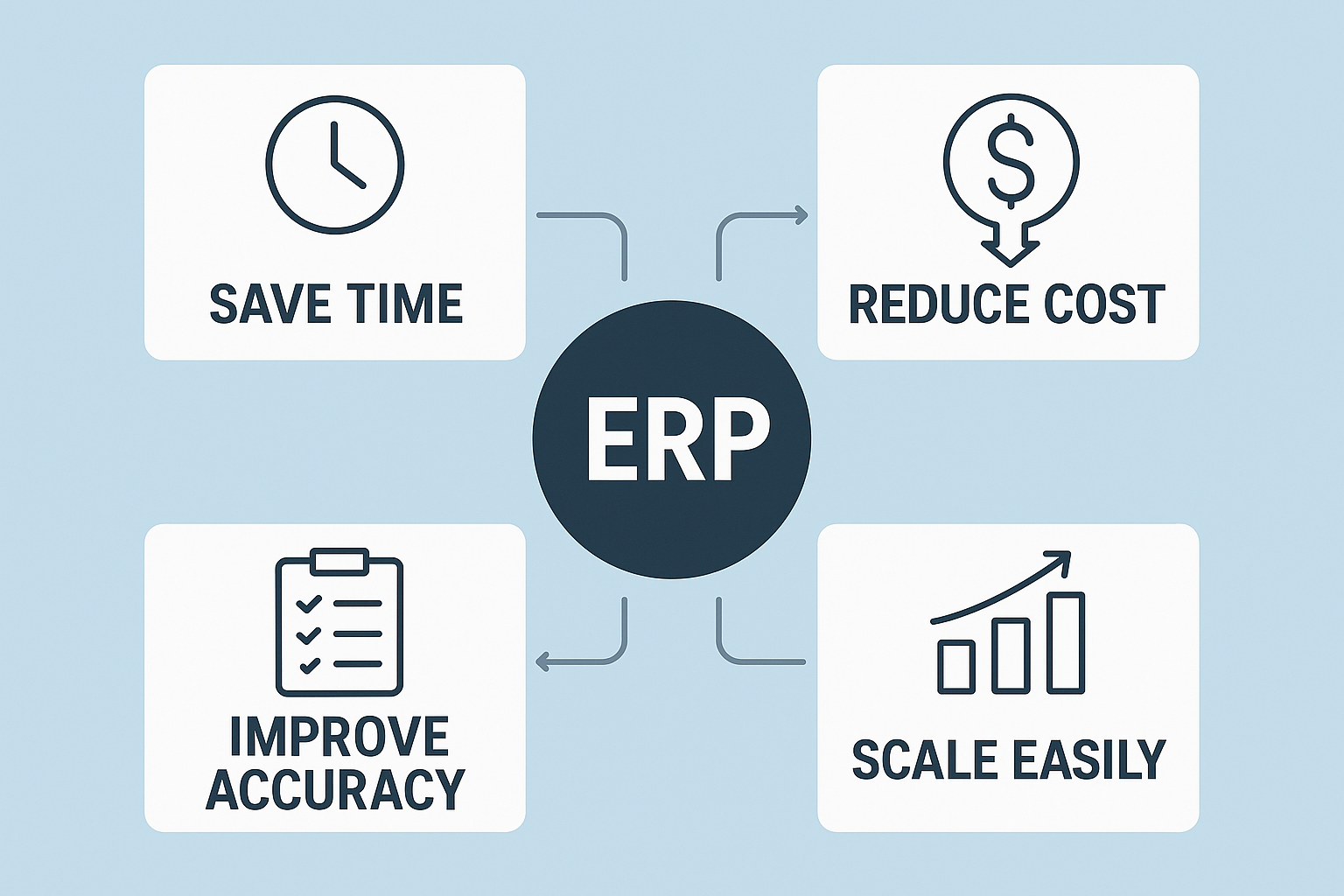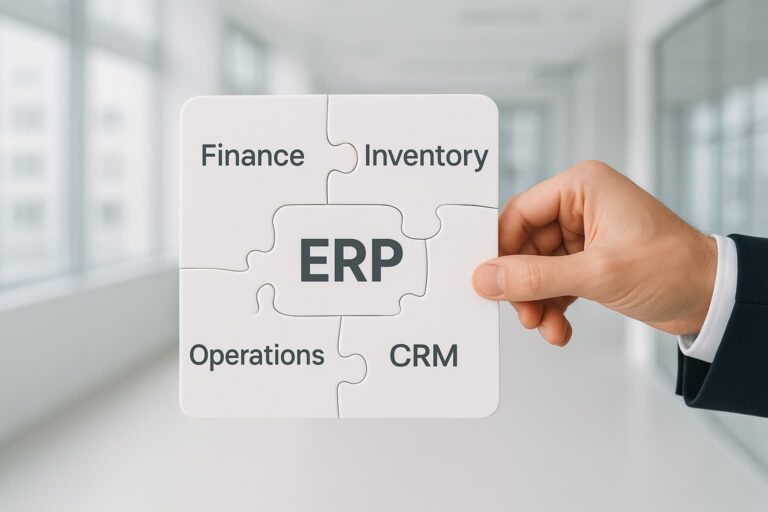An ERP(Enterprise Resource Planning) system is software that connects all parts of your business, such as sales, marketing, customer support, finance, operations, manufacturing, and online platforms like Shopify. Unlike past generations, the new generations of ERP systems are cloud-based. They are hosted on a secure environment called a cloud platform, which offers security, scalability, connectivity, and AI-assisted decision-making for leaner and more efficient business operations.
Modern ERP systems come packaged with different modules described in detail below, organizations adapt one or more modules depending upon their requirements. Normally, erp implementation partners do a needs assessment and recommend the modules for the business. Trustfort specialises in needs assessment for ERP transformation and brings its decade long experience, you can book a free needs assessment call here.
ERP System Example
Let’s take an example case of how an ERP system improves operational efficiency and leverages connectivity to fuel business growth. Suppose a manufacturer specializes in health care systems like glucometers. Let’s call it GM systems.
Sales Module
GM Systems sales team contacts different hospitals and clinics to demonstrate and sell their glucometers. Each salesperson needs a system to keep track of
- Visits
- Deal Size
- Stakeholders Contact information
- Meeting Notes
- Meetings Schedule
- Sales Proposals
An ERP system lets a salesperson add and manage these details. With AI capabilities built into modern erp systems like Microsoft Dynamics 365 Business Central, a salesperson can use conversational AI support to classify, optimize, and prioritize their sales efforts using their own past sales data by just typing simple text prompts.
Marketing Module
GM Systems marketing team works with campaigns across different online and offline channels. They craft targeted messaging, manage lead funnels, and identify potential opportunities. The team needs to collaborate with different internal and external stakeholders. Apart from a system that lets them track different KPIs related to campaigns, they have a collaboration software, like Microsoft Teams. Using Teams keeps the calls, meeting schedules, and calendars all in one place, resulting in easier collaboration throughout the business.
Customer Service/Support Module
GM Systems provide customer services as an integral part of business. These services fall into two categories
– Customer Services
These teams normally reside in a call center and handle issues like billing, accounts, and generating support tickets.
– Field Service
The teams perform repair and maintenance tasks on/off-site, they require scheduling, dispatching, and equipment/parts to perform their jobs.
ERP service/support module lets GM Systems manage organization-wide customer support activities with a single support module. This built-in AI assistance helps in troubleshooting, task or personnel scheduling by learning from the organization’s past and existing work loads, resulting in increased customer satisfaction and experience.
Finance Module
Finance module is often adopted as the first module to bring transparency and visibility into financial operations. This results in reliable financial planning, forecasting and budgeting. It also performs automatic reconciliation between different revenue sources, saving time and errors.
- Manage Payments, Payables and Receivables
- Reconcile payments automatically
- Pay Bills, Rent automatically
- Inventory/Procurement process
- AI Assisted Budgeting & Forecasting
Operations Module
Some erp vendors provide a separate finance module and a separate operations module while others package them together as a single finance and operations module, GM Systems uses the Finance and Operations module to manage and optimize operations like inventory management, manufacturing, supply chain and logistics.
HR Module
GM Systems values their workforce well well-being, as happy employees are productive employees, so their HR module keeps them up to date and their employees happy, by providing them visibility into
- Immediate needs like emergency or short leaves by simplifying the request and approval process.
- By outlining clear policies and communicating them across the organization with a single click.
- AI Assisted Recruitment by learning from past star performer attributes, crafting valuable interview questions
- Training and Evaluations
Commerce Module
GM Systems has a Shopify website that seamlessly integrates with their ERP system via the Commerce module. It provides support in merchandising, sales channel management, sales reporting, mobile experience, marketing efforts, and analytics.
Key TakeAways
- Adopting erp systems significantly lowers operating costs. It’s expensive in the start but it’s worth in long term.
- They have a high success rate if the implementation approach is Agile.
- Modules from a single vendor work well, but you are free to use modules from other vendors, if they relate more closely to how you work.
- With partner app providers, you are never out of options for the best implementation or custom enhancements.
- Cloud-based ERP systems have made ERPs secure, cost-effective, and accessible from everywhere. The updates in the cloud-based ERP systems are automatically scheduled and implemented after your approval, saving you IT support fees and infrastructure costs.
- They provide organization-wide visibility, and with AI assistance, you are always learning from your data.
Trustfort as a reliable Business Central Implementation Partner
Modern ERP systems like Microsoft Dynamics 365 Business Central, SAP S/4 HANA, Oracle are cloud-based ERPs. These systems contain packages/modules to optimize different parts of your business. An ERP system implementation requires the services of a business central erp implementation partner such as Trustfort, which identifies and then maps the business requirements to ERP modules.


